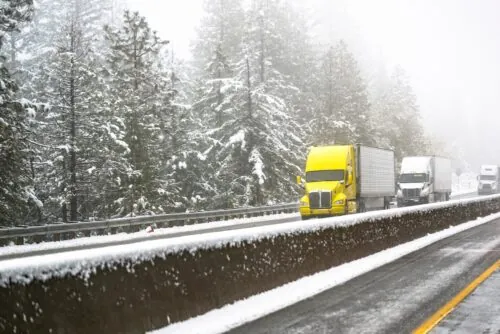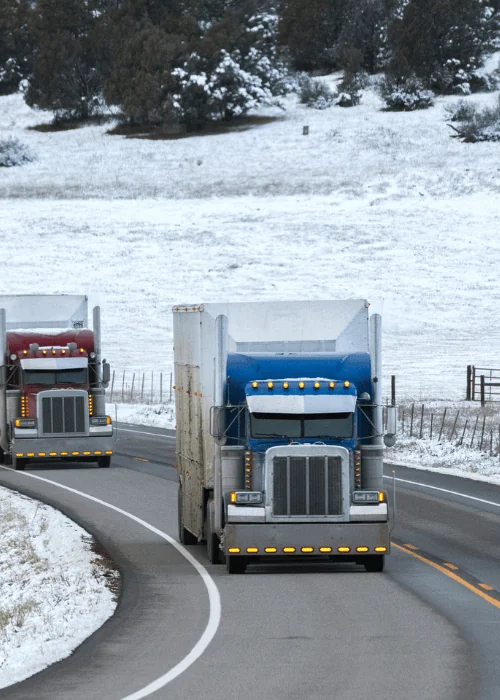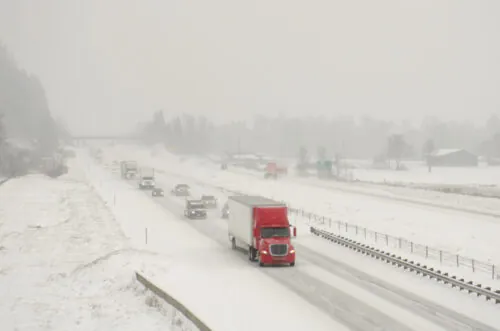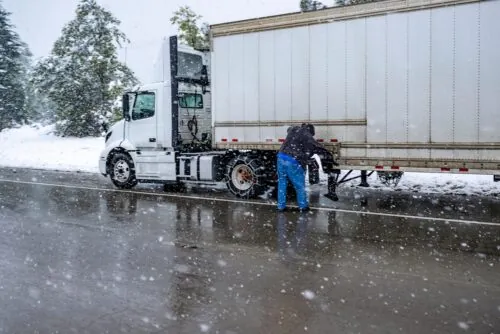Most Common Winter-Related Delays In The Trucking Industry
It’s almost that time of year, and we’re not talking about the holiday season but rather the other anticipated season – winter – which officially begins Dec. 21.
The winter season brings different challenges for the transportation and logistics industry, as it must prepare to deal with winter-related delays and other complications that frigid conditions bring, especially to the trucking sector.
But, with unpredictable weather patterns becoming more and more common, the wintry air associated with the season can arrive much earlier.
In early November, Winter Storm Anya pounded parts of New Mexico and Colorado, leaving truckers stranded on I-40 and causing 120 traffic accidents, according to Albuquerque officials, leading to many delays for carriers transporting goods.
Winter Storm Anya is just the beginning of what could occur within the next four months in places anticipating snow or colder weather,
So, what are the most common winter-related delays in the trucking industry that can be expected this year, and well…every year? Let’s find out.

Weather-Induced Complications
Weather conditions can significantly impact the efficiency and reliability of logistics operations. Many different factors can cause slowdowns and delays for truckers on the road. These include:
- Icy Roads: Cold temperatures and snow can leave roads covered in ice, which, when driven on, can reduce tire traction, longer braking distances, skidding and even spinouts. Black ice is hazardous because it can be difficult to distinguish from wet roads.
- Hydroplaning: Even without snow, rainfall can lead to dangerous conditions. Wet roads can cause hydroplaning – when tires lose contact with the road – leading to skidding and potential accidents.
- High Winds: Winter storms typically bring high wind speeds, making it difficult for drivers to control trucks as the wind pushes the vehicle. Many truckers have to drive over bridges to reach their destination. Driving on elevated roads with high winds can make it even more complicated, exposing the truck to direct wind gusts.
- Reduced Visibility: Rain, snow and sleet can reduce visibility, making it harder for truckers to see the road ahead. This can lead to significant slowdowns to avoid any accidents.
Maintenance Issues
Plummeting temperatures and icy roads can make even the most minor issue a major one. Winter weather conditions can be harsh on trucks and trailers, so fleet managers and drivers must ensure their vehicles are in tip-top shape for long and often treacherous trips.
Although some are built to transport cold cargo, when the weather dips down to freezing cold temperatures, trucks are at an increased risk of their internal systems having issues. Some equipment and maintenance issues that can occur include:
- Battery: Cold temperatures can decrease a battery’s efficiency, making it run out of charge more quickly or causing issues with starting the truck. This is because the cold slows down the chemicals inside of the battery that make it run.
- Tires: Cold weather can cause tire pressure fluctuations. Low tire pressure can increase the risk of skidding or sliding on roads because they have less grip. It’s crucial to check the pressure regularly and inflate them if needed.
- Fuel: Diesel fuel can crystallize when temperatures reach 15 degrees Fahrenheit or lower. This is called gelled fuel, which can clog fuel lines and cause the engine to stop running. Truckers or fleet managers should add a fuel additive to prevent this from occurring.
- Frozen Components: Internal components inside the truck, such as the DEF tanks, air brake system, and fuel line, can freeze, causing low performance.
- Poor Wiper Blades: Winter weather can make it difficult to see through a windshield. Ensuring that trucks are equipped with winter-specific wiper blades can help to clear off snow and ice more efficiently.
Logistical Complications
The winter season brings many logistical complications to the forefront, as the unpredictable weather can be dangerous. Winter storms can cause road closures due to or ice or too much snow on the roads, fallen branches, and, in some cases, flooding.
These road closures force trucks to take detours, which can slow down and delay delivery times, especially if the detour is a longer route than the original.
Another logistical complication of the time of year is the lack of sunlight. During winter, daylight hours are limited, and less sunlight means decreased visibility.
There are oversized and overweight travel restrictions that limit the movement of heavy haul trucks to daylight hours. The restrictions vary from state to state, but truckers have less time on the road, increasing the risk of delays.
During winter, increased demand for products is widespread, not only because of the holiday season but because many businesses and consumers tend to stock up on essentials in anticipation of harsh weather.
The increase in demand increases the amount of trucks on the road. The heavier traffic, along with unpredictable weather, can lead to delays.
These complications can cause delays, unpredictable delivery schedules, and even disruption to the supply chain, leading to decreased customer satisfaction.
Winter can be extremely taxing on the trucking industry, with safety hazards, a higher risk of maintenance issues, heavier traffic, and road closures.
Trucking companies and their drivers must be prepared for the long, wintry road ahead. By planning routes, educating drivers on safety precautions and safe driving practices, and maintaining upkeep on all fleets, truckers can reach their destination promptly and safely.





